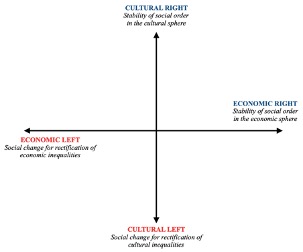left-right
-

Two is Better than One? Testing a Deductive MARPOR-based Left-Right Index on Western Europe (1999-2019)
To cite the article: Trastulli, F. (2022). Two is Better than…
-

Tories and Labour: mainstream parties riding on conflict
In our assessment of the current state of the British public debate based…
-

The issue opportunity structure for UK parties: leftist economic agenda vs. British chauvinism
Building on the tools provided by issue yield theory (De Sio…
-

UK voters support leftist goals, but economic left-right is not the main dimension of competition
Beyond the study of the issues that are considered as a…